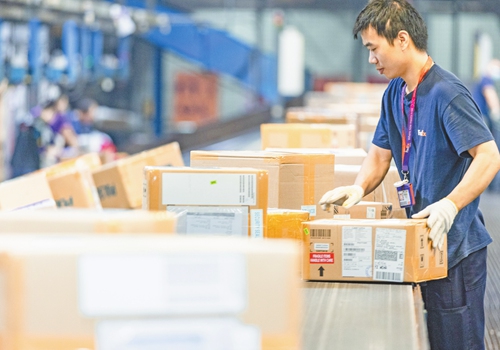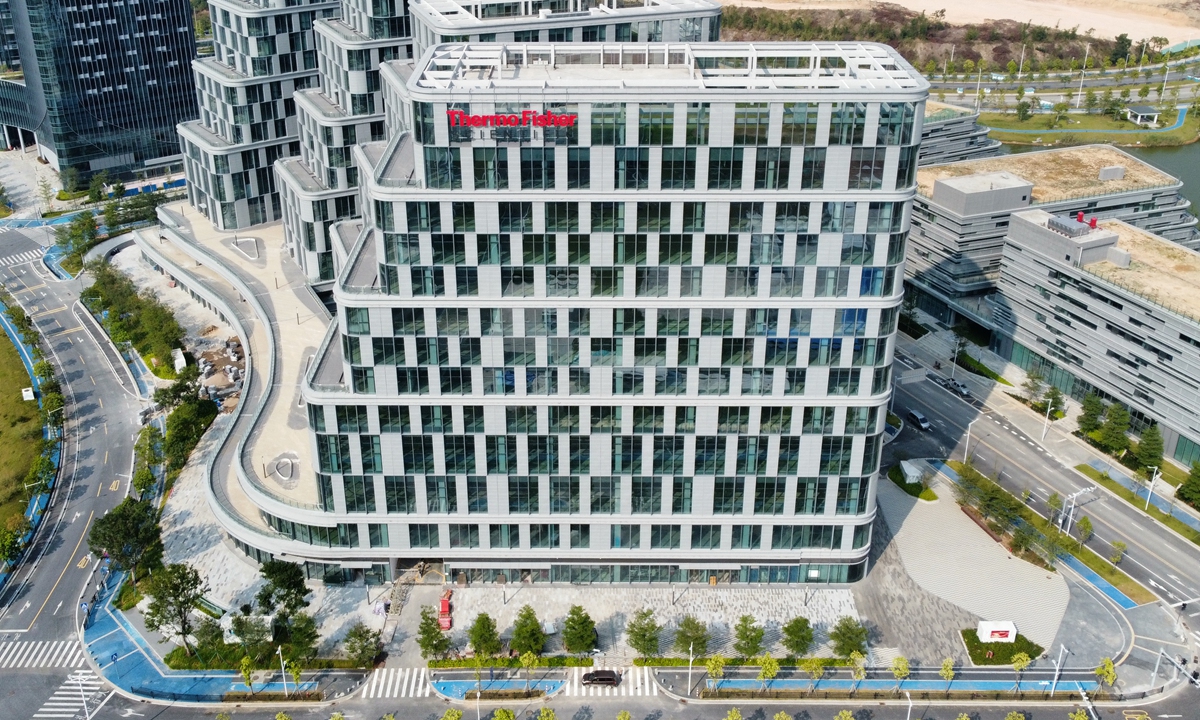
A view of Dongguan Nestlé Co in Dongguan, South China's Guangdong Province Photo: Courtesy of Dongguan Nestlé
Editor's Note:
This year marks the fifth anniversary of the unveiling of the Guangdong-Hong Kong-Macao Greater Bay Area Development Plan. The Chinese government unveiled its blueprint to turn the Greater Bay Area (GBA) into a role model of high-quality development, an international first-class bay area and a world-class city cluster.
The GBA is well on its way to shaping the future of high-quality development and driving sustainable economic growth. As one of the most economically open and vibrant areas in China, the region is at the forefront of China's reform and opening-up and technological innovation. It has developed from the world's factory into a world-class financial and innovation hub. The Global Times looks at the region's progress in meeting targets set for it, how different cities are vying to attract foreign enterprises, investing in research and development, achieving sustainable development and more.As the head of Dongguan Nestlé Co, Huang Yaoqin has worked in the company for more than 20 years. Being one of the earliest employees of the company, he has witnessed the expansion of the factory, and the development of overseas companies in Dongguan, South China's Guangdong Province.
"The south is the forefront of China's reform and opening-up. Guangdong is close to Hong Kong, where many people drink coffee daily, which is also an important reason why we can attract a large number of consumers," Huang told the Global Times.
Dongguan Nestlé Co was established in 1988. It is the earliest coffee factory established by Nestlé in Chinese mainland. It is also one of the earliest and largest multinational investment enterprises in Dongguan, one of the cities in the Guangdong-Hong Kong-Macao Greater Bay Area.
From Nestlé's perspective, the Greater Bay Area, a key strategic project, leverages the comprehensive advantages of Guangdong, Hong Kong and Macao. The Greater Bay Area's thriving economy and large consumer base provide immense market potential for Nestlé.
Nestlé's development is just an example for foreign investment development in the Greater Bay Area.
Official data showed that the total economic output of the Greater Bay Area exceeded 14 trillion yuan ($1.97 trillion) in 2023, up from 1.08 trillion yuan in 2018, achieving one ninth of China's total with less than 0.6 percent of the national territorial area.
This region, which consists of the Hong Kong and the Macao special administrative regions and nine cities in the Pearl River Delta, is rapidly emerging as a global force that cannot be ignored.

An employee works at the FedEx Asia Pacific Hub, in Guangzhou, South China's Guangdong Province in October, 2023. Photo: Courtesy of FedEx
Extensive radiation effectsWalking in the Nestlé factory, the impressive coffee brown factory building blends in with the surrounding high-rise buildings and residential buildings. The factory area is quiet and the roar of the machines can hardly be heard. Workers are neatly dressed when entering and leaving the operating area.
Entering in the production workshop of factory, the mellow aroma fills one's nostrils. Outsiders would never imagine that such a factory can produce thousands of tons of instant coffee a year. Here, the reporters personally experienced the daily work of a coffee "taster." The staff needs to taste the flavor, acidity, sweetness and consistency and other elements of the coffee every day to ensure consistent quality and high standards.
Thanks to various policies supporting business development in the Greater Bay Area, such as streamlined customs clearance, Nestlé Hong Kong also imports fresh milk and other raw materials from the Greater Bay Area, Simon Cheung, managing director of Nestlé Hong Kong, told the Global Times.
The favorable business environment in the Greater Bay Area effectively promotes regional economic synergy, helping us showcase our products to consumers in different cities across the country, accelerating our business expansion in the region, Cheung added.
In Cheung's view, the Greater Bay Area is strategically located in the Pearl River Delta, with excellent geographical advantages and convenient transportation links to major cities in the Chinese mainland, providing businesses with efficient logistics and supply chain networks.
The growth of the foreign trade in the Greater Bay Area brings logistics demands, which propel the high-speed development of the logistics sector. The area has become one of the critical leverages for FedEx development in China, Robert Chu, a vice president of operations with FedEx China, told the Global Times.
The Greater Bay Area has always been the most important part of our development strategy, we have international port operation centers and professional customs clearance teams in the three places, using its own flights to help customers quickly connect to the international market, he added.
For example, the FedEx APAC Hub, located at the Guangzhou Baiyun International Airport, currently operates more than 200 international flights and 700 trucks per week, connecting South China and Hong Kong.
As the first international express company to operate cargo flights at Shenzhen Bao'an International Airport, FedEx operates 10 international flights in Shenzhen per week currently, connecting Asian and American markets.
"FedEx has been developing in tandem with the China market. Since the establishment of the Greater Bay Area, we have been supporting its development through our infrastructure and ever-expanding network," Chu said.

A view of a building of Thermo Fisher Scientific in Guangzhou, South China's Guangdong Province. Photo: Courtesy of Thermo Fisher Scientific
New opportunities
In the past three or four decades, China's main advantage for foreign investment was its low labor costs. Now, the booming emerging industries, especially with the new quality productive forces, have become new growth points attracting foreign investment.
As new quality productive forces continue to unleash the power here, the Greater Bay Area is gradually developing from the world's factory into a world-class city cluster that can compete on the international stage in fields such as technology innovation, continuous expansion of infrastructure construction and fin-tech.
The Greater Bay Area's strong policy impetus and industrial development potential are well matched with our focus on meeting the business priorities of local partners in vertical fields such as pharmaceuticals and biopharmaceuticals, medical health, academic research and application markets, Zhou Xiaobin, a vice president of commercial operations of Thermo Fisher Scientific's China Analytical Instruments Business Group, told the Global Times.
In 2022, Thermo Fisher Scientific, teamed up with Guangzhou Development Zone, jointly invested in a base to produce value-added products including high-end laboratory equipment, analytical instruments and laboratory consumables. In 2023, this large-scale production and manufacturing base was officially opened.
"We see China's future market opportunities in innovative technology fields such as new energy, semiconductors, new materials, biopharmaceuticals and life sciences," Zhou said.
This year's Government Work Report adopted at the two sessions also highlighted emerging industries and future industries including actively creating new growth engines such as biomanufacturing, commercial aerospace and low-altitude economy, as well as the intelligent connected vehicles industry.
The Greater Bay Area has provided good policy and regulatory support for the development of intelligent connected vehicles, and is actively expanding demonstration areas for intelligent connected vehicles to lay the foundation for future large-scale applications, a representative of Toyota China told the Global Times.
As an important platform in the Greater Bay Area, Nansha district is the first to be fully open to high-level autonomous driving and ranks first in the country in terms of total open road mileage. It has also become Guangzhou's first pilot area for testing and mixed traffic demonstration operations.
A representative of Toyota China said that it will seize this opportunity, make full use of the technology accumulated in intelligent network connection and actively cooperate with local partners in China to jointly promote the local research and development of intelligent driving technology.
Toyota said that the Greater Bay Area is at the forefront of the country in intelligent network connection. The integrated development of the Greater Bay Area will promote further opening-up and collaboration of industries and markets in the region, providing more opportunities for them.
Continuously increasing confidenceThe development process of foreign enterprises in China can be said to be closely connected with the process of China's reform and opening-up, Cao Heping, an economist from Peking University, told the Global Times.
They have created many employment opportunities for China and improved the living standards of the Chinese people, they have also promoted the innovation capabilities of Chinese enterprises. At the same time, foreign-funded enterprises have also gained huge profits from the Chinese market and expanded their influence in the global market, Cao added.
Official data showed that Guangzhou's actual use of foreign investment increased from $4.58 billion in 2012 to $8.78 billion in 2022, with an annual growth of 5.9 percent. As of 2023, the cumulative actual use of foreign capital exceeds $130 billion. A total of 345 Fortune 500 companies have invested in Guangzhou, with 1,968 investment projects.
The increase of the investment is also echoed with the pace of foreign capital in China. In the first half of 2024, the country attracted nearly 500 billion yuan in foreign investment, remaining at an elevated level for nearly one decade. The same period saw nearly 27,000 foreign-invested companies set up in China, representing a year-on year growth of 14.2 percent.
Those interviewed also said that China's efforts of opening-up have conveyed more confidence in enterprises.
FedEx has always been a staunch supporter of, and advocate for, global trade. During the past four decades in China, we have witnessed and contributed to its economic development and opening-up. Our engagement in the Chinese market has been mutually beneficial, allowing us to flourish alongside the nation's development, Chu said.
China possesses vast market potential and abundant human resources, attracting different enterprises to expand their operations and bring high-quality products to a larger consumer base. China's efforts to promote market openness contribute to the establishment of a more transparent business environment. This provides businesses with a stable and sustainable development platform, enhancing their confidence in business expansion, echoed Simon Cheung from Nestlé Hong Kong.
Foreign companies also highlight that the Chinese government's continuously policies to promote technological innovation and high-quality development, as well as its continuous efforts to optimize the business environment, make them continue to be optimistic about the Chinese market.
A series of measures taken by the Chinese government to improve the foreign investment policy and legal system and promote pre-establishment national treatment and negative list have enhanced our confidence in continuing to promote high-quality development in China, a representative of Toyota China said.






